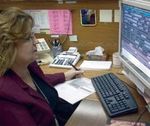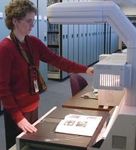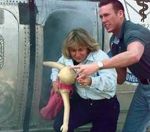The FAA Civil Aerospace Medical Institute...
←
→
Page content transcription
If your browser does not render page correctly, please read the page content below
Welcome to
The FAA Civil Aerospace
Medical Institute...
The Civil Aerospace CAMI is the medical
certification, research,
Medical Institute education, and occupational health wing of the
FAA’s Office of Aerospace Medicine. The goal of
our activities is to enhance aviation safety.
After America’s first successful flight in
1903, the first aviation fatality could not be far
off. Amazingly, five years would pass before the
first fatal accident. But since then, safety has
been an important concern. In 1926, the Civil
Aeronautics Act marshaled the talents of the
An International medical profession to certify that all aviators are
Resource physically fit to fly.
Thus, our principal concern at CAMI is
the human element in flight—pilots, flight
attendants, passengers, air traffic controllers—
and the entire human support system that
embraces civil aviation. We study the factors
that influence human performance in the
aerospace environment, find ways to understand
them, and communicate that understanding to
the aviation community.
The Institute’s people—researchers,
physicians and other medical specialists,
engineers, educators, pilots, technicians, and
communicators—all merged as a team in 1961
at our centralized Oklahoma City facility. Since
then, the CAMI team’s synergistic products
serve people everywhere as they safely and
routinely achieve one of the oldest of human
dreams: Flight!Aerospace Medical Certification
ince 1926, the Federal Aviation Administration
S has developed and utilized health standards for
airmen to assure the safety of all who fly. By federal
law, all aviators must be medically certified. About
a half-million airman medical certificates are issued
each year on the basis of physical examinations, all of
which require prompt review by the Aerospace Medical
Certification Division’s staff.
To manage this massive data influx, a new
Internet-based system was developed. Called the
Document, Imaging, and Workflow System, it now
receives about 1,800 examinations each day via the
Internet. This extraordinary computer system makes
it possible for reviewers to resolve medical cases on
standard office computer stations. Before the new
system was implemented, examinations submitted
for review were mailed in, copied, then distributed,
reviewed, resolved, and, finally, stored on shelves—a
colossal storage and retrieval problem.
Today, medical records are stored in digital form,
allowing faster retrieval, review, and more accurate
certification decisions to be made.
he Civil Aerospace Medical Institute has
T more than a dozen complex labs and large-
scale, computerized health system and performance
databases. Our most important resource is our staff.
These professionals are dedicated to their work at the
Institute—serving an aviation community and public
that rely upon safe, dependable air transportation.
Medical examinations from aviation medical examiners are
transmitted via the Internet and reviewed by an Aerospace
Medical Certification Division legal examiner or physician.
Bottom line: Greatly enhanced service
to the aviation community.Aerospace Medical Education Aerospace Human
Factors Research
T he FAA is required by the U.S. Congress to pro-
mote the safe and efficient use of America’s airspace.
One way the Civil Aerospace Medical Institute promotes
aviation safety is through aerospace medical education
H uman factors scientists study the behavior and
performance of people, both in laboratory stud-
ies and while at work in aviation environments. Hu-
programs that: man factors are the characteristics of human beings that
• Train and evalu- are applicable to the design of systems and devices of
ate the performance all kinds. These include selecting the right person for
of Aviation Medical the job and determining the skills, tasks, training, and
Examiners, a special- equipment that influence performance, especially for
ized group of 3,700 safety-critical jobs like those of aircrew members and air
physicians located traffic controllers.
in the U.S. and in Aviation is a demanding work environment; our
about 100 countries scientists look for ways to achieve harmony between
around the world, An aviation medical examiner
individuals and their tasks, between the operator and the
appointed by the FAA and staff member view self- computer, aircraft, or display.
to perform the re- directed refresher training
quired airman medical program in their office.
examinations. A pilot, serving
as a research
• Train civil avia- subject, flies the
tion pilots and FAA CAMI Advanced
aircrews in avia- General Avia-
tion physiology and tion Research
Simulator
global survival skills. during an as-
sessment of the
• Disseminate human factors
aeromedical infor- of advanced
mation to the civil CAMI’s General Aviation Pilot displays.
aviation community Trainers teach pilots to recognize
through publications and manage the symptoms of
(print and online) and spatial disorientation.
participation (lectures New Advanced
and practical demonstrations) in the National Aviation Air Traffic Con-
Safety Program. trol Research
Simulator.
• Provide specialized aerospace medical library services. Researchers
validate design
objectives to
ensure that
controllers
and equip-
ment perform
harmoniously.
Bottom line: Resources that directly Bottom line: Improving performance,
enhance aviation safety. efficiency, and overall aviation safety.Aerospace Medical Research Occupational Health
erospace medical issues are studied by scientists,
A engineers, and technical specialists working in two
major laboratories.
Bioaeronautical Sciences Research
C AMI’s health professionals administer Federal
Aviation Administration occupational health
programs for agency employees at the Mike Monroney
• Supports aircraft acci- Aeronautical Center. These programs are mandated by
dent investigation through the Occupational Safety and Health Act; and Executive
medical and toxicological Order 12196, Occupational Safety and Health Programs
analysis. for Federal Employees. They also provide professional
• Researchers develop advice and technical knowledge to the Federal Air
improved analytical pro- Surgeon and other agency officials. A professional,
cedures and evaluate pilot technical, and clerical staff manages programs in
performance-related aspects
occupational medicine, clinical services, and industrial
of drugs and alcohol.
• Medical and accident hygiene.
The CAMI Toxicology Lab
databases support research assists in determining the
activities regarding pilot cer- medical causes of fatal
tification and performance. aviation accidents.
· Atmospheric radiation research and analysis relative to
aircraft occupant safety and health.
Protection and Survival Research
• Biodynamic and cabin
evacuation research to im-
prove occupant survivability
in aircraft accidents.
• Physiological aspects of al-
titude and the aircraft envi-
ronment research to support
improved protective systems
and safety procedures.
• Medical and vision re- Smoke evacuation study in
search to support the certifi- realistic conditions.
cation of aircrew. Occupational health
programs help to
improve the health
and safety of FAA
employees who
work in potentially
hazardous locations
across the country.
The 747 Aircraft Environment Research Facility being
utilized for evaluation of simulated emergency
aircraft evacuation.
Bottom line: Applied medical research teams evaluate
the adverse events that occur in aerospace operations Bottom line: Occupational health programs
and discover methods to enhance human safety, security, improve the safety and health standards
health, and performance. of employees and the aviation community.The Civil Aerospace Medical Institute is located at the Mike Monroney Aeronautical Center in Oklahoma City, Oklahoma.
For more information about programs, services, and publications, visit our Web site:
GENERAL INFORMATION FOR PILOTS
FOR PHYSICIANS
www.faa.gov/ ( + )
• Medical certification information for pilots
www.faa.gov/ ( + ) . . .licenses_certificates/medical_certification/get
• How to become an aviation medical examiner • Locate an aviation medical examiner in your area
• Continuing medical education for aviation medical . . .pilots/amelocator
examiners • Pilot and air traveler safety information
. . .other_visit/aviation_industry/designees_ . . .passengers/fly_safe/health
delegations/designee_types/ame/ametraining • Physiological Training and Basic Survival Classes
• Guide for Aviation Medical Examiners . . .pilots/training/airman_education
. . .about/office_org/headquarters_offices/avs/offices/
aam/ame/guide
Or write:
Director, Civil Aerospace Medical Institute, AAM-3
FOR RESEARCHERS Federal Aviation Administration
• Office of Aerospace Medicine Technical Reports P.O. Box 25082
. . .library/reports/medical/oamtechreports/index.cfm Oklahoma City, OK 73125
Publication AM-400-04/1 (rev.11/09)
Federal Aviation Administration
Written by Civil Aerospace Medical Institute
Michael E. Wayda Aerospace Medical Education Division, AAM-400You can also read



























































